HENRY DAVID THOREAU
|
Henry David Thoreau was born in Concord, Massachusetts on July 12, 1817 and christened David Henry Thoreau. He attended school in Concord, went to Harvard University in 1833, and graduated in 1837. That year he read Ralph Waldo Emerson's Nature, probably heard Emerson deliver "The American Scholar" as an address to Harvard's Phi Beta Kappa Society, became a personal friend of the older writer (who had moved to Concord a few years prior), and at Emerson's recommendation began to keep a journal. In search of an occupation, Thoreau taught school in Concord, but resigned after two weeks in protest against being forced to administer corporal punishment on six students in a single afternoon. He changed the order of his first and middle names and in 1838 delivered his first lecture, "Society," at the Concord Lyceum. That same year, he returned to teaching, this time on his own terms, establishing a school and incorporating into his pedagogy the revolutionary concepts of recess and field trips. In 1840 his first published work appeared in the inaugural issue of The Dial, under the editorship of Margaret Fuller. With the closure of his school in 1841, Thoreau moved into the Emerson family home, earning room and board as the family's groundskeeper and handyman. In early 1842, Thoreau's beloved brother John, age 27, died of lockjaw after cutting his finger with a razor. John's death profoundly affected Henry and would influence some of his major life decisions. Thoreau moved to Staten Island in 1843 to live with the family of William Emerson, the writer's brother, and serve as tutor for his three sons, but he found life in New York disagreeable. For a short time while there, he sold magazine subscriptions door-to-door. Within seven months he had returned to Concord and would never again live beyond its environs. During 1844 he worked in earnest at the Thoreau family's pencil factory behind their Concord home, helping to improve the materials and means of production for the graphite pencil cores. On July 4, 1845 Thoreau moved into a 10-foot by 15-foot cabin he'd built himself on the small east cove of Concord's Walden Pond. The cabin, situated on a parcel of land owned by Emerson, was Thoreau's residence for two years, two months, and two days, during which time he drafted his first book A Week on the Concord and Merrimack Rivers in memory of his brother, and wrote large portions of what would become his masterpiece, Walden. On a July day in 1846 while walking to town to have a shoe mended, Thoreau was arrested and held for one night in the Concord jail for refusal to pay his poll tax. He explained that he could not in good conscience underwrite slavery and the Mexican-American War with his own money. He was released the following day when an unknown person paid the tax on his behalf. The jailing episode resulted in Thoreau's seminal essay "Civil Disobedience," first delivered as a lecture in 1848. Mohandas Ghandi, John F. Kennedy, Martin Luther King, Jr., Leo Tolstoy, and many other have credited "Civil Disobedience" as a major influence. Upon leaving Walden, Thoreau returned to the Emerson family home, helping Mrs. Emerson manage the household while her husband lectured in Europe. A year later he relocated to the upstairs bedroom of the Thoreau family home on Concord's Main Street, where he would live the rest of his life, earning wages from surveying, general handywork, and his occasional lectures and magazine publications. Thoreau made extended excursions to Cape Cod, the Maine wilderness, and Quebec, and reflected on these travels in his writings. He was acquainted with many literary figures in his day, including Nathaniel Hawthorne, the Alcott family, the James family, Walt Whitman, and Horace Greeley. He was instrumental in the Underground Railroad in Concord and lectured in defense of the militant abolitionist John Brown in the weeks preceding Brown's execution by the U.S. government. He spent the greater part of his time walking in the woods and fields surrounding Concord, and recording his philosophy and natural observations in the journal he'd started in 1837. His almost daily journal entries span the course of 25 years and amount to roughly two million words. Walden was finally published in August of 1854. Though for the most part critically well-received, by 1859 the book had only sold around 2,000 copies. Thoreau died of tuberculosis in early 1862 at age 44, having just completed his final essay "Walking," in which appear the words "In wildness is the preservation of the world."
(Biographical sketch by M. Allen Cunningham, from Funny-Ass Thoreau, Atelier26 Books, 2016.) |


